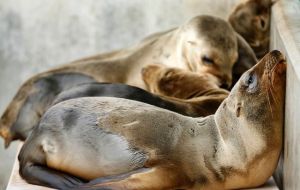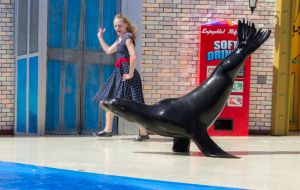MercoPress. South Atlantic News Agency
Hundreds of sea lion pups stranded in California as nursing mothers can’t find sufficient food
 Scientists believe sea lions are suffering from a scarcity of natural prey which forces nursing mothers to venture farther out to sea, leaving their young behind for longer periods.
Scientists believe sea lions are suffering from a scarcity of natural prey which forces nursing mothers to venture farther out to sea, leaving their young behind for longer periods.  SeaWorld shut down its sea lion shows so that the San Diego-based company could use the staff and facilities, including building two temporary pools for the pups.
SeaWorld shut down its sea lion shows so that the San Diego-based company could use the staff and facilities, including building two temporary pools for the pups. Animal rescue centers in California are being inundated with stranded, starving sea lion pups, raising the possibility that the facilities could soon be overwhelmed, the federal agency coordinating the rescue said.
The precise cause is not clear, but scientists believe the sea lions are suffering from a scarcity of natural prey which forces nursing mothers to venture farther out to sea for food, leaving their young behind for longer periods.
“As facilities reach capacity, it will likely not be possible to rescue and rehabilitate every impacted animal,” said Justin Viezbecke, stranding coordinator for the National Oceanographic and Atmospheric Administration. This year, a record 1,450 starving pups have been rescued in Southern California.
Mary Beth Steen, director of development for the Pacific Marine Mammal Center in Laguna Beach, said the center has taken in 285 animals - 10 times last year's final tally of 28 and double the count for 2013.
“We are particularly concerned because the stranding season usually starts in March and ends in June,” she said. “These are extraordinarily high numbers early in the season.”
Last Friday, SeaWorld shut down its sea lion shows so that the San Diego-based company could use the staff and facilities - including building two temporary pools for the pups - in anticipation of more rescues.
SeaWorld has taken in nearly 500 of the starving animals, according to SeaWorld spokeswoman Kelly Terry.
The pups are usually born in June and July, and nurse until January, remaining on shore while their mothers go to sea for food, according to David Bard of the Marine Mammal Care Center in San Pedro, California, which has taken in more than 330 of the starving pups since January.
NOAA scientists believe that the mothers aren't easily finding food and are staying away longer than the normal one- to two-day journey because of changes in water temperature.
At some point, the pups seem to be heading out to sea on their own, and washing up starving and exhausted on California beaches in record numbers. Most need help to start eating again and veterinarian Hendrik Nollens said that some of the pups have come in with five or six pounds of rocks in their stomachs.
“They eat them to feel full and have been able to regurgitate them once we can get them to start eating again,” Nollens said.




Top Comments
Disclaimer & comment rules-

-

-

Read all commentsThe precise cause is clear, the Argentine Govt. has denied them access to The Falkland Islands thus causing great pain and suffering.
Mar 18th, 2015 - 03:44 am 0(Not true, I know, but it is the kind of thing the trolls would say in reverse.)
haha!
Ah, the famous Anglo conservation at work once again I see! The one the tossers on this board claim is so superior to Argentine conservation.
Mar 18th, 2015 - 06:03 am 0Just like in New Zealand with the Maui dolphin.
Don't birds fall from the sky in the USA west coast too? Why would anyone be shocked by this? It's not like world's biggest garbage dump is off the USA coast...
Oh wait... it is.
And there we have @2, exactly as I predicted.
Mar 18th, 2015 - 09:28 am 0Could they be any more dense? The article discusses how many have been saved, and how.
Actually, that was far too easy to provoke the troll. Like shooting fish in a barrel. ..
*bored*
I'd prefer to talk to the Sea Lions. They have obviously read the article in more depth than TTT.
Commenting for this story is now closed.
If you have a Facebook account, become a fan and comment on our Facebook Page!